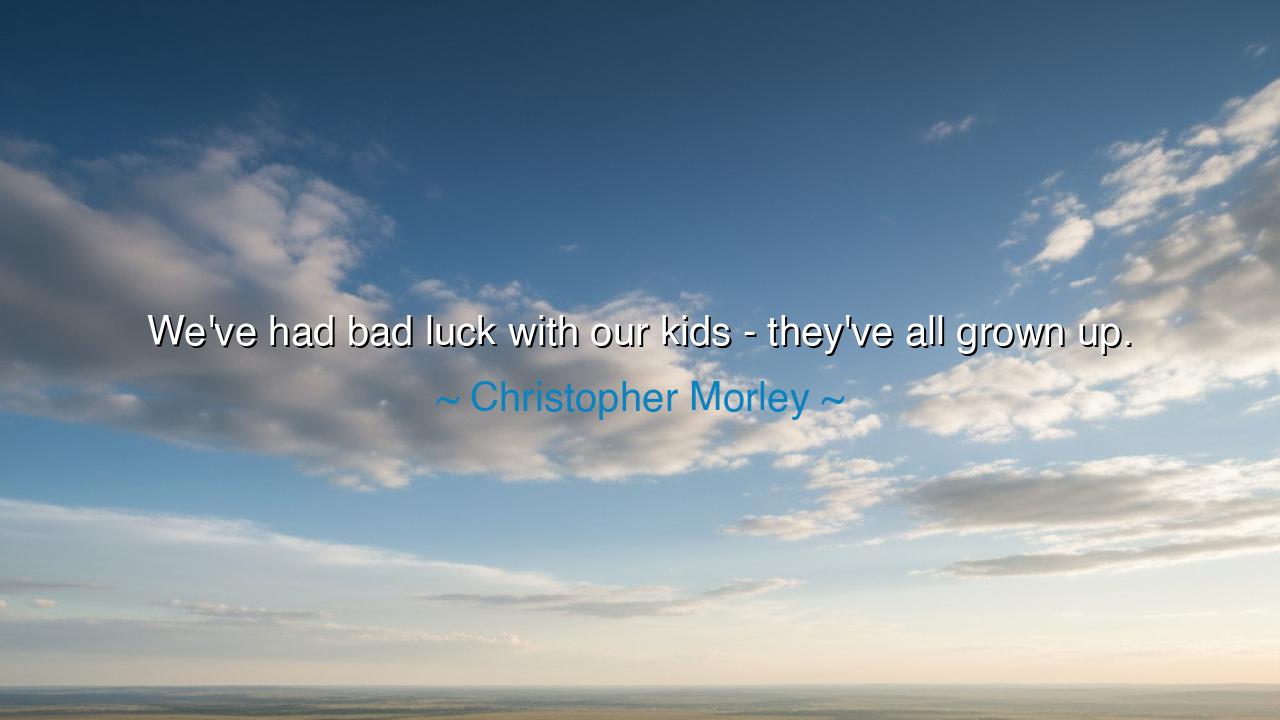
We've had bad luck with our kids - they've all grown up.






In the playful yet deeply poignant words of Christopher Morley, we encounter a truth wrapped in humor: “We’ve had bad luck with our kids—they’ve all grown up.” On the surface, it is a jest, a light remark about the inevitability of age. Yet beneath the laughter lies a tender ache known to every parent—that childhood, with all its innocence and wonder, is fleeting, and that to see one’s children grow is both a blessing and a quiet sorrow.
The meaning of the quote is that while we long for our children to thrive, to mature, and to take their place in the world, we also mourn the loss of their youth. The games, the laughter, the dependency—all these vanish as quickly as dawn fades into daylight. What Morley calls “bad luck” is not misfortune at all, but the natural order of life. Yet he speaks as one who feels the bittersweetness of that truth, wishing perhaps that the days of small hands and unguarded smiles might linger just a little longer.
The ancients, too, reflected on this paradox. In the poetry of Horace, we are told to “seize the day,” for time’s passing is relentless. The Greek tragedians often placed before us the fleeting beauty of youth, warning that it slips away even as we delight in it. Parents of every age have known that to raise a child is to say farewell, slowly but surely, to the world of innocence. The humor of Morley’s words masks the universality of this grief.
Consider the example of Queen Victoria, who as a mother of nine, cherished her children’s younger years, surrounding them with nurseries and devoted governesses. Yet as they grew and married into Europe’s royal houses, she felt a deep loneliness. She had gained dynastic influence, but she lost the simple presence of her little ones. So it is with many parents: they dream of their children’s growth, and yet when it comes, they yearn for the past.
Yet there is also triumph in this “bad luck.” For to see one’s children grow up is to know that they have survived the perils of infancy, learned the lessons of youth, and stepped into the path of independence. It is what every parent hopes for, even as it breaks the heart. Morley’s quip reveals the paradoxical essence of parenthood: the very success of raising a child brings about the parent’s loss of the child’s childhood.
The lesson for us is this: cherish the present moment. Do not hurry the days away, nor wish for milestones too quickly. Childhood is a short season, and once it passes, it does not return. Instead of lamenting its end, let us live fully within it, treasuring every moment of laughter, every story read aloud, every hand held on the way to bed. To do so is to soften the sorrow when the years inevitably move on.
Practical wisdom follows. Take time each day to be present with your children, no matter their age. Capture the memories in writing or in photographs, but more importantly, in the living memory of the heart. When they grow, rejoice in who they become, even as you remember who they were. And never forget: the child may grow up, but the bond of love between parent and child is eternal, untouched by time.
Thus, in the gentle irony of Christopher Morley, we are reminded of the bittersweet truth: the “bad luck” of children growing up is in fact the greatest good. For in their growing, they carry forward the legacy of love, even as they leave behind the fleeting beauty of childhood. Let us, then, embrace both the joy and the sorrow, for in them together lies the fullness of parenthood.






AAdministratorAdministrator
Welcome, honored guests. Please leave a comment, we will respond soon